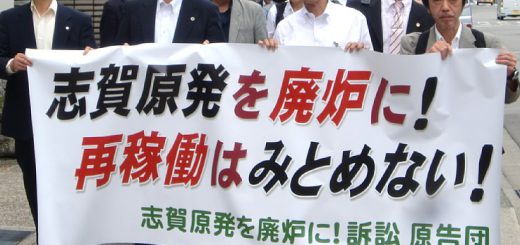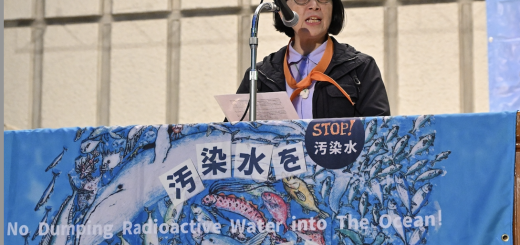CNIC Statement: Don’t push the risk onto citizens with the amendment of the Compensation for Nuclear Damage Act
CNIC Statement
12 November 2018
On November 2, a bill for the partial amendment of the Compensation for Nuclear Damage Act (hereafter, CND) was submitted to the Diet.
In the first place, this CND amendment is based on supplementary regulations demanding “a drastic review including an amendment of CND at the earliest possible date” and “necessary measures from the viewpoint of minimizing the burden on the people of the nation” when the Nuclear Damage Compensation Facilitation Corporation Act was deliberated in the Diet in 2011. Further, both houses of the Diet limited “at the earliest possible date” to “around a year” and determined, by supplementary decisions attached to that act, that “deliberations to clarify the nature of liability in Article 3 of CND and the nature of the government’s liability including the nature of compensatory payments in Article 7 of CND” should also be carried out. In 2015, however, a specialist committee on the nuclear compensation system was set up within the Atomic Energy Commission, and even after serious deliberations had begun progress was extremely slow. It was not until October 30, 2018 that a final draft was approved.
The main points of the draft amendment are: 1) Nuclear power plant (NPP) operators are mandated to prepare and publish a new damage compensation implementation policy, 2) Creation of a system for the government to lend funds to the operator for early compensation (provisional payments) to affected persons before the start of the main compensation payments, 3) In the case that alternative dispute resolution (ADR) by the Nuclear Damage Dispute Reconciliation Committee is terminated, it will be deemed that an appeal has been submitted at the time of the request for settlement mediation if the appeal is brought before the court within one month after the notification of termination of ADR, and 4) The compensatory fund is to be left unchanged at 120 billion yen.
It is surprising that 1) is not already being carried out by NPP operators. At the time of the TEPCO Fukushima Daiichi nuclear accident the government had already devised measures similar to 2) for provisional compensation in the Act on Emergency Measures for Damage due to Nuclear Accidents. 3) can be said to be rational since there has been a series of cases in which the nuclear business side has rejected settlement proposals. On the other hand, the content of 4) is strikingly problematic since it does nothing to adjust the astoundingly miserly current compensatory fund of 120 billion yen in the face of the estimated 22 trillion yen in damages for the TEPCO Fukushima Daiichi nuclear accident.
Originally, CND began as an exemption of makers from liability due to nuclear accidents in order to encourage the construction of nuclear power plants. The discussions in the latest series of reviews have progressed with no mention of this point, but in fact we believe the specialist committee should have taken one step further and questioned the liability of nuclear reactor makers.
Looking back on the deliberations for the Nuclear Damage Compensation Facilitation Corporation Act, where the argument began, it can be seen that there was a shared understanding that the compensatory fund of 120 billion yen was inadequate. Even in the specialist committee, there was general agreement among the committee members on the point that the amount of the compensatory fund should be raised. At the same time, the executive director of the Japan Atomic Energy Insurance Pool (JAEIP), committee member Tetsuro Kihara, stated at the fifth committee meeting, “A five or ten trillion level is simply impossible…. but the idea of lifting the current 120 billion yen to a level of 150 or 200 billion yen is a different question.” While making this statement, which appears to suggest that there is a margin for raising the level of the compensatory fund, he made an about-face at the 17th meeting by denying that there was any margin for raising the amount of the fund by stating, “The conclusion is that, as far as the insurance industry is concerned, it would be extremely difficult to raise the fund above 120 billion yen.” The nuclear business operators themselves also opposed a raise.
Looking back on the deliberations for the Nuclear Damage Compensation Facilitation Corporation Act, where the argument began, it can be seen that there was a shared understanding that the compensatory fund of 120 billion yen was inadequate. Even in the specialist committee, there was general agreement among the committee members on the point that the amount of the compensatory fund should be raised. At the same time, the executive director of the Japan Atomic Energy Insurance Pool (JAEIP), committee member Tetsuro Kihara, stated at the fifth committee meeting, “A five or ten trillion level is simply impossible…. but the idea of lifting the current 120 billion yen to a level of 150 or 200 billion yen is a different question.” While making this statement, which appears to suggest that there is a margin for raising the level of the compensatory fund, he made an about-face at the 17th meeting by denying that there was any margin for raising the amount of the fund by stating, “The conclusion is that, as far as the insurance industry is concerned, it would be extremely difficult to raise the fund above 120 billion yen.” The nuclear business operators themselves also opposed a raise.
However, it is quite clear, firstly, that it is impossible for JAEIP to hold a mammoth sum of 22 trillion yen in insurance money. If so, while considering raising the amount of the compensatory fund, and to minimize the burden on the people of the nation, rather than maintain the compensation scheme with the premise of allowing the nuclear business operators to continue to exist, based on the Act on the Nuclear Damage Compensation and Decommissioning Facilitation Corporation, it should have been necessary to devise a new compensation scheme based on the 22 trillion yen in damages arising from the TEPCO Fukushima Daiichi nuclear accident that did not necessarily insist on the continued existence of the nuclear business operator. With the specialist committee unable to get a grasp on this problem, we are left with the unavoidable question of what on earth the committee, and the Atomic Energy Commission which led it, had been doing for three years, after which they simply threw the ball back at the Ministry of Education, Culture, Sports, Science and Technology (MEXT).
In the meantime, on October 25, just before the conclusion was reached, MEXT, under whose jurisdiction CND lies, stated at a Liberal Democratic Party (LDP) Education, Culture, Sports, Science and Technology section meeting that it had accepted the CND amendment. This constitutes an extremely grave problem from the viewpoint of procedure. Why should MEXT be going to an LDP section meeting to give explanations without having received the conclusion of the specialist committee? It is impossible for both MEXT and the specialist committee to avoid censure for their disrespect for deliberations.
CND is directly linked with the problem of the interests of citizens regarding how nuclear energy risks are distributed under the unlimited liability of nuclear business operators. If NPPs are to be operated on just a very small burden, the risk of “cheap NPPs” is essentially borne by the citizens. The bill for the amendment utterly fails to resolve this problem and would allow NPPs to be operated with the citizenry, as ever, bearing the huge risk involved. Implementing deregulation of the power industry while accepting that it is fine to push this enormous risk onto the citizens greatly alleviates the burden on nuclear business operators and will lead to a serious deterioration in the competitive environment.
The U.S. Price–Anderson Nuclear Industries Indemnity Act concentrates liability for damage due to a nuclear accident on the operator regardless of whether the fault lies with the operator or not, and also established a system whereby a ceiling of 1.5 trillion yen is guaranteed through a mutual assistance system between operators. At the same time, the act also states (42 U.S. Code § 2210 (i) (2) (B)) that in the event of an amount exceeding this, funds from industrial circles and others will be considered. In the case of the U.S., the amount of damages in the Three Mile Island nuclear accident did not exceed the amount of the compensatory fund. In Japan, however, damages arising from the TEPCO Fukushima Daiichi nuclear accident, even by government estimates, will total roughly 22 trillion yen (including the cost of decommissioning). As provision against further accidents, the mutual assistance among the operators, based on the current Act on the Nuclear Damage Compensation and Decommissioning Facilitation Corporation, will be totally inadequate.
The current legal amendment began from a demand to consider the law from the viewpoint of minimizing the burden on the people of the nation. If so, while it is natural to maintain the unlimited liability, and based on the premise of the damage arising from the TEPCO Fukushima Daiichi nuclear accident, a mutual assistance system should be set up to include not only the operators but all those in nuclear power industry circles who have profited from the nuclear energy business thus far in sharing the burden. This is the duty that should be borne by the operators and nuclear power industry circles who have expanded a business that has the potential to cause the horrendous damage we have seen from just one accident. If they cannot do this because they believe the risk is too high, the only option is for the operators to withdraw from the nuclear power business.


